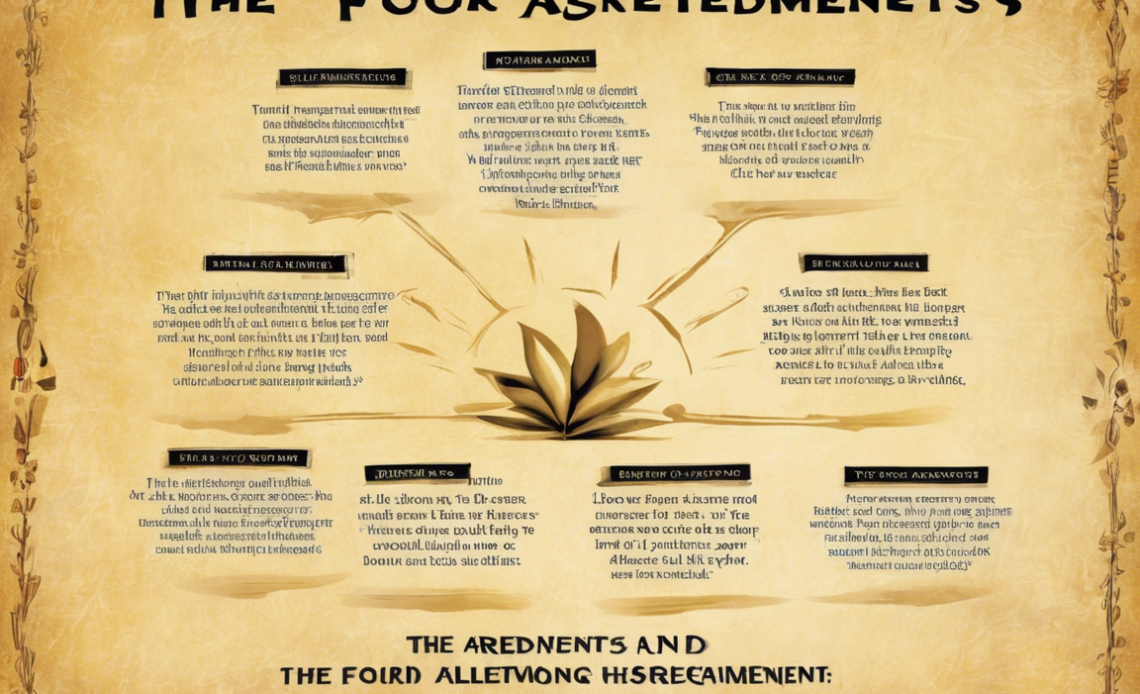
Introduction
The Four Agreements PDF is a practical guide to personal freedom based on the book “The Four Agreements: A Practical Guide to Personal Freedom” by Don Miguel Ruiz. The book presents a code of personal conduct based on ancient Toltec wisdom that can profoundly transform one’s life and relationships. In this comprehensive guide, we will delve into the key concepts of the book and explore how you can apply them to achieve personal freedom and fulfillment.
The Four Agreements
-
Be Impeccable with Your Word: This agreement emphasizes the power of words and the importance of using language in a positive and honest way. Our words have the power to create or destroy, so it is crucial to speak with integrity, avoid gossip and self-criticism, and use the power of our word in the direction of truth and love.
-
Don’t Take Anything Personally: This agreement teaches us not to take things personally, as what others say and do is a projection of their own reality, not a reflection of who we are. By not internalizing the opinions and actions of others, we can free ourselves from needless suffering and drama.
-
Don’t Make Assumptions: Making assumptions leads to misunderstandings, conflicts, and unnecessary pain. This agreement encourages us to ask questions, express our thoughts and feelings clearly, and avoid making assumptions about others’ intentions. By seeking clarity and open communication, we can cultivate healthy relationships based on trust and understanding.
-
Always Do Your Best: The fourth agreement is about giving your best effort in everything you do, regardless of the circumstances. By focusing on your actions and intentions rather than the outcomes, you can avoid self-judgment and regret. Doing your best every day will lead to self-empowerment, growth, and a sense of fulfillment.
Practical Applications
-
Self-Reflection: Take time to reflect on your thoughts, words, and actions. Are you being impeccable with your word? Are you making assumptions or taking things personally? By cultivating self-awareness, you can identify areas for growth and transformation.
-
Mindfulness Practices: Incorporate mindfulness techniques such as meditation, deep breathing, and journaling into your daily routine. These practices can help you stay present, calm your mind, and cultivate inner peace.
-
Setting Boundaries: Learn to set healthy boundaries in your relationships and communicate your needs effectively. Boundaries are essential for self-care and maintaining healthy connections with others.
-
Practicing Forgiveness: Release grudges, resentments, and negative emotions by practicing forgiveness. Forgiveness is not about condoning the actions of others but about freeing yourself from the burden of anger and pain.
Frequently Asked Questions (FAQs)
-
What is the significance of being impeccable with your word?
Being impeccable with your word means speaking with integrity and using your words to spread positivity and love. It is essential for building trust, creating healthy relationships, and manifesting your intentions. -
How can I stop taking things personally?
To stop taking things personally, remind yourself that people’s actions are a reflection of their own reality, not a judgment of your worth. Practice self-compassion, detach from others’ opinions, and focus on your own self-worth. -
Why is it important to avoid making assumptions?
Making assumptions can lead to misunderstandings, conflicts, and unnecessary suffering. By seeking clarity, asking questions, and communicating openly, you can avoid misinterpretations and cultivate deeper connections. -
How can I always do my best, especially in challenging situations?
Doing your best is about giving your maximum effort in every moment, regardless of the circumstances. Focus on the process, not the outcome, and trust that your consistent effort will lead to personal growth and success. -
Can practicing the four agreements improve my mental health?
Yes, practicing the four agreements can have a positive impact on your mental health by promoting self-awareness, mindfulness, healthy boundaries, and emotional resilience. These principles can help reduce stress, anxiety, and negative thought patterns.

